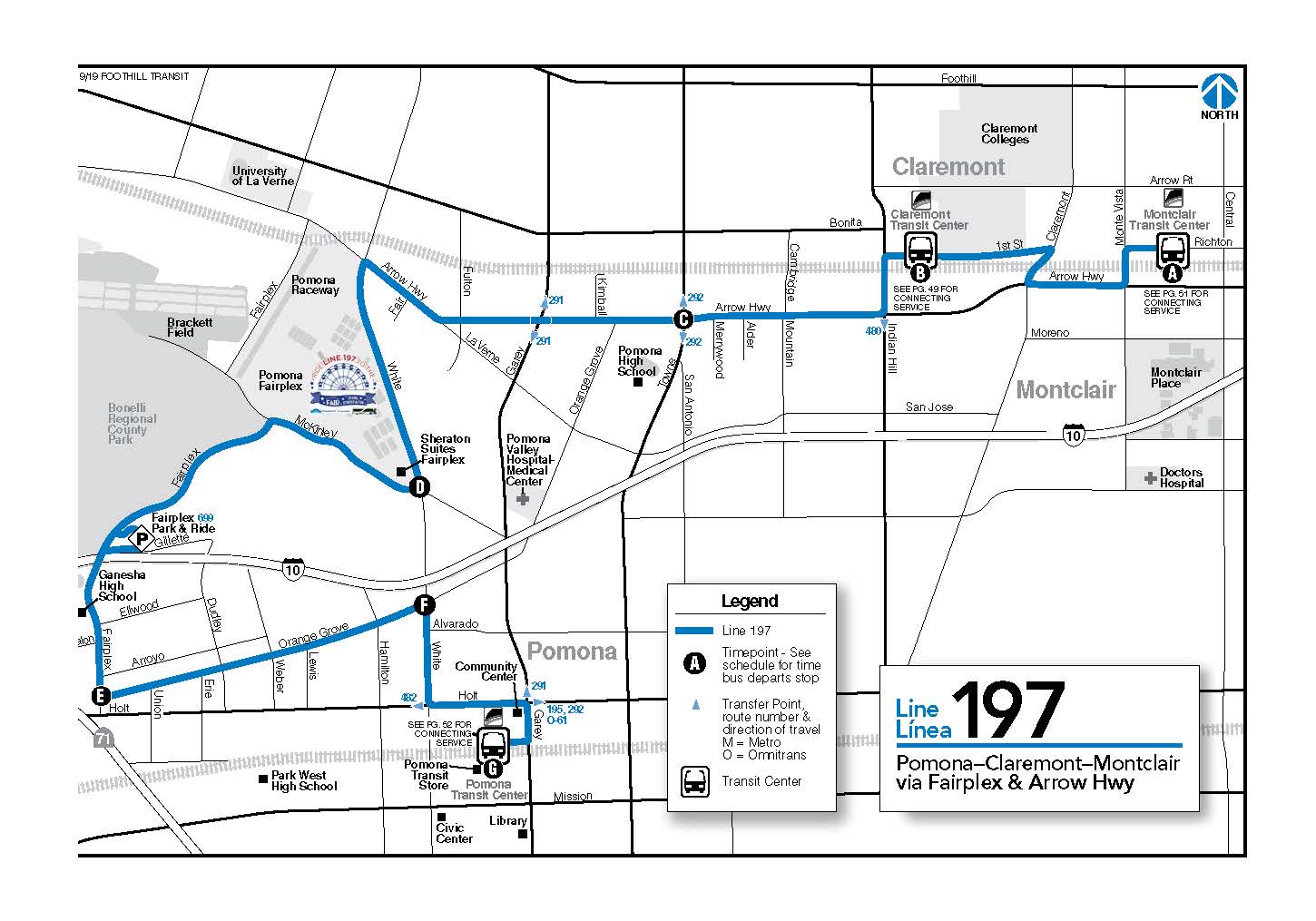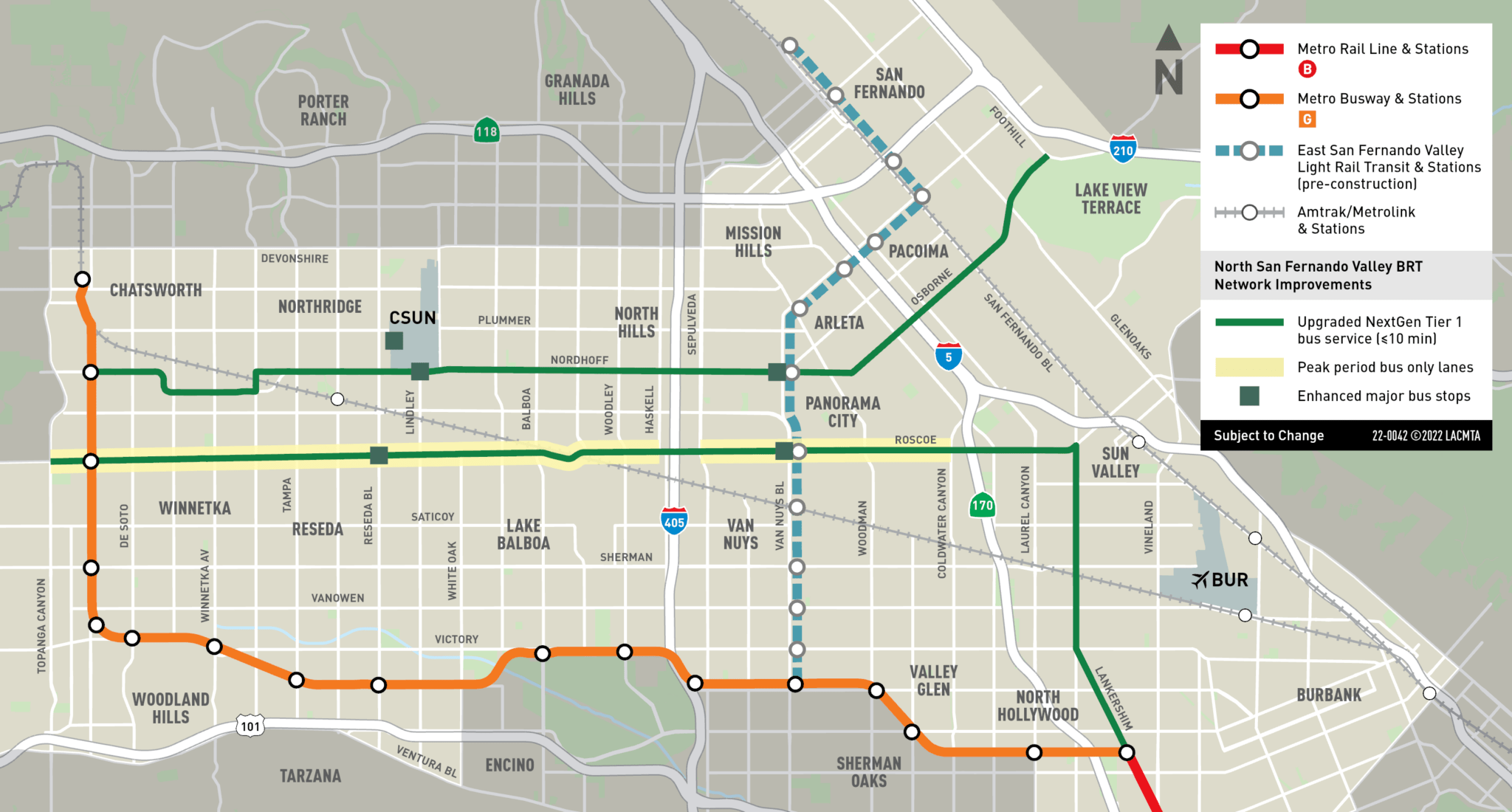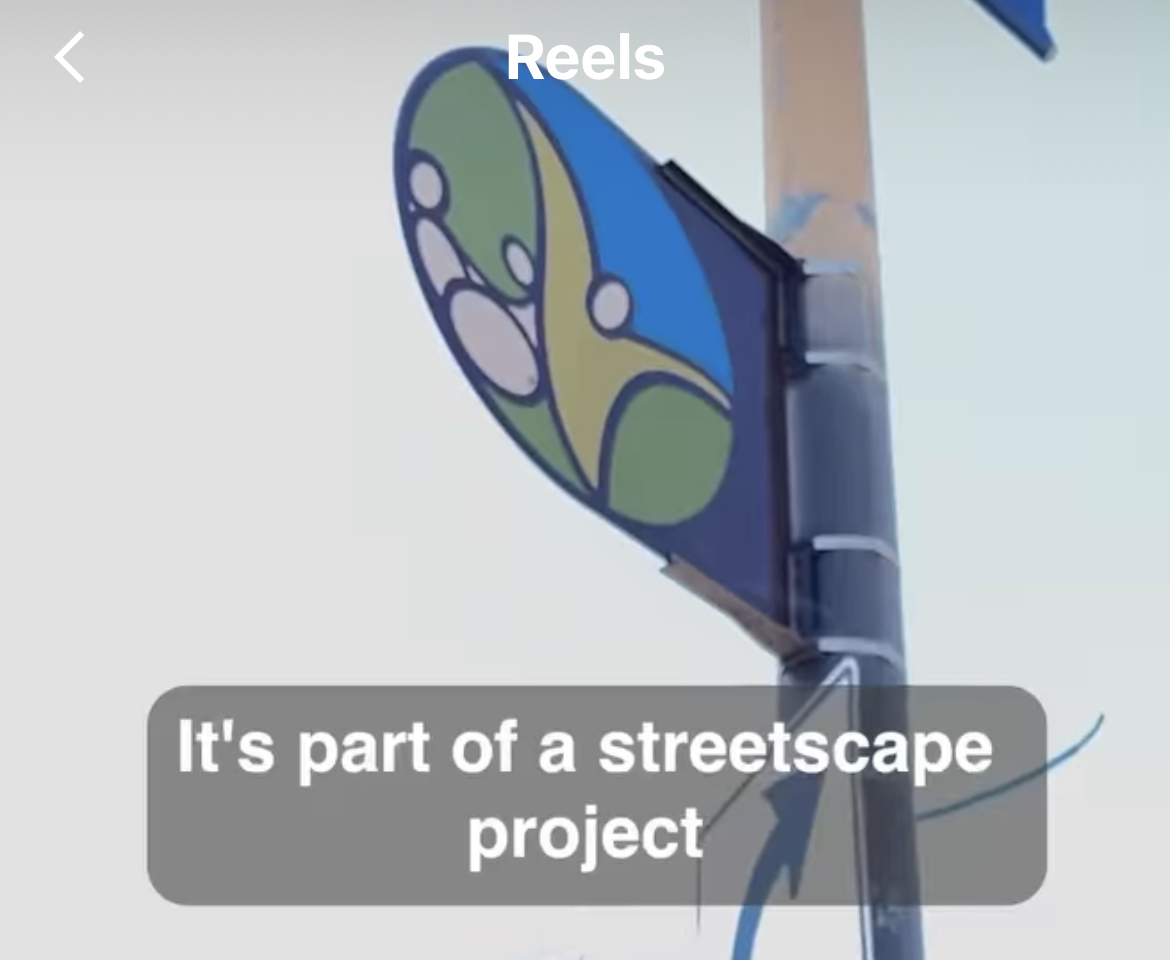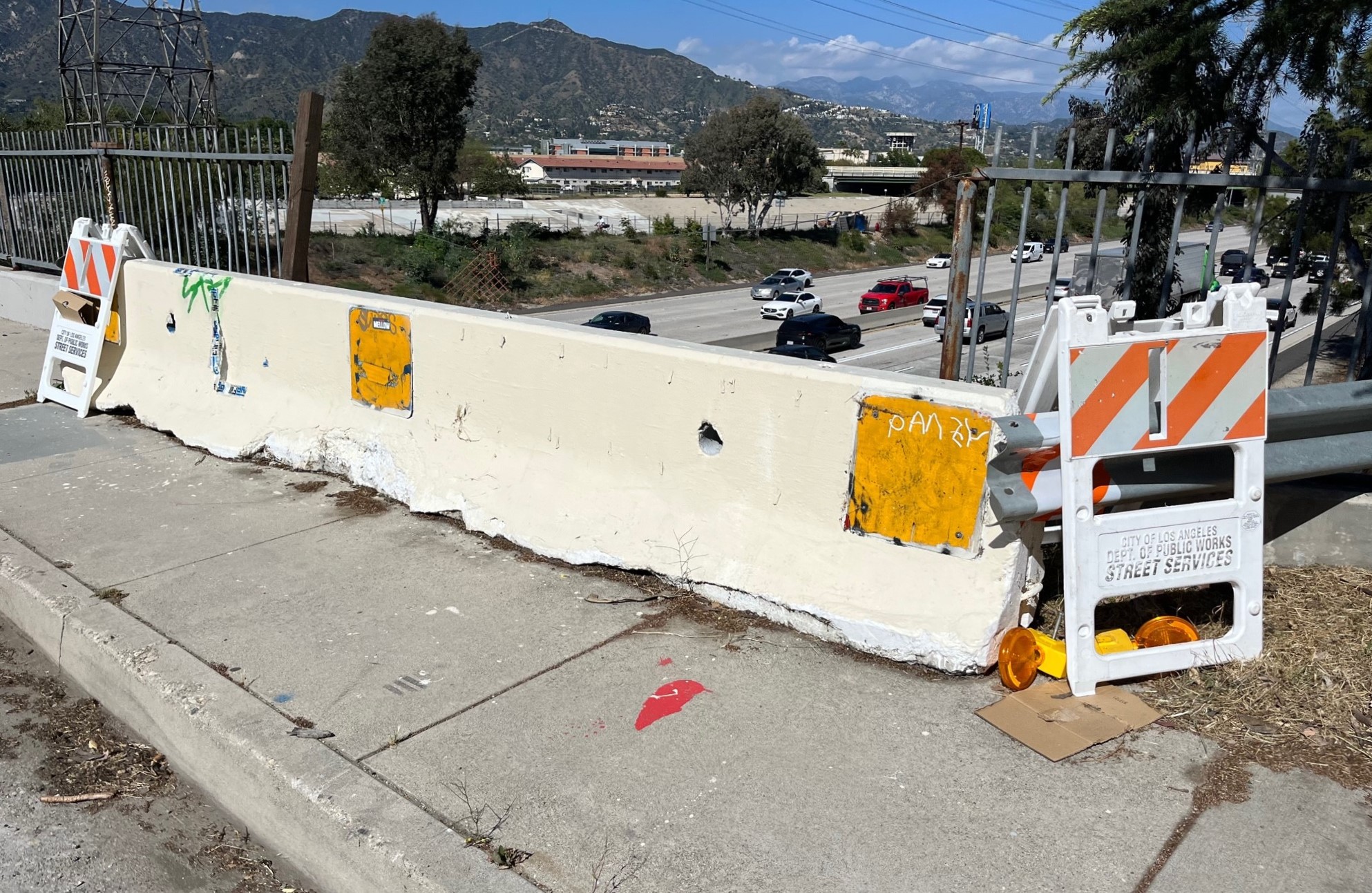Metro Considering E-Scooter Parking Rules for Stations
12:33 PM PDT on April 18, 2019
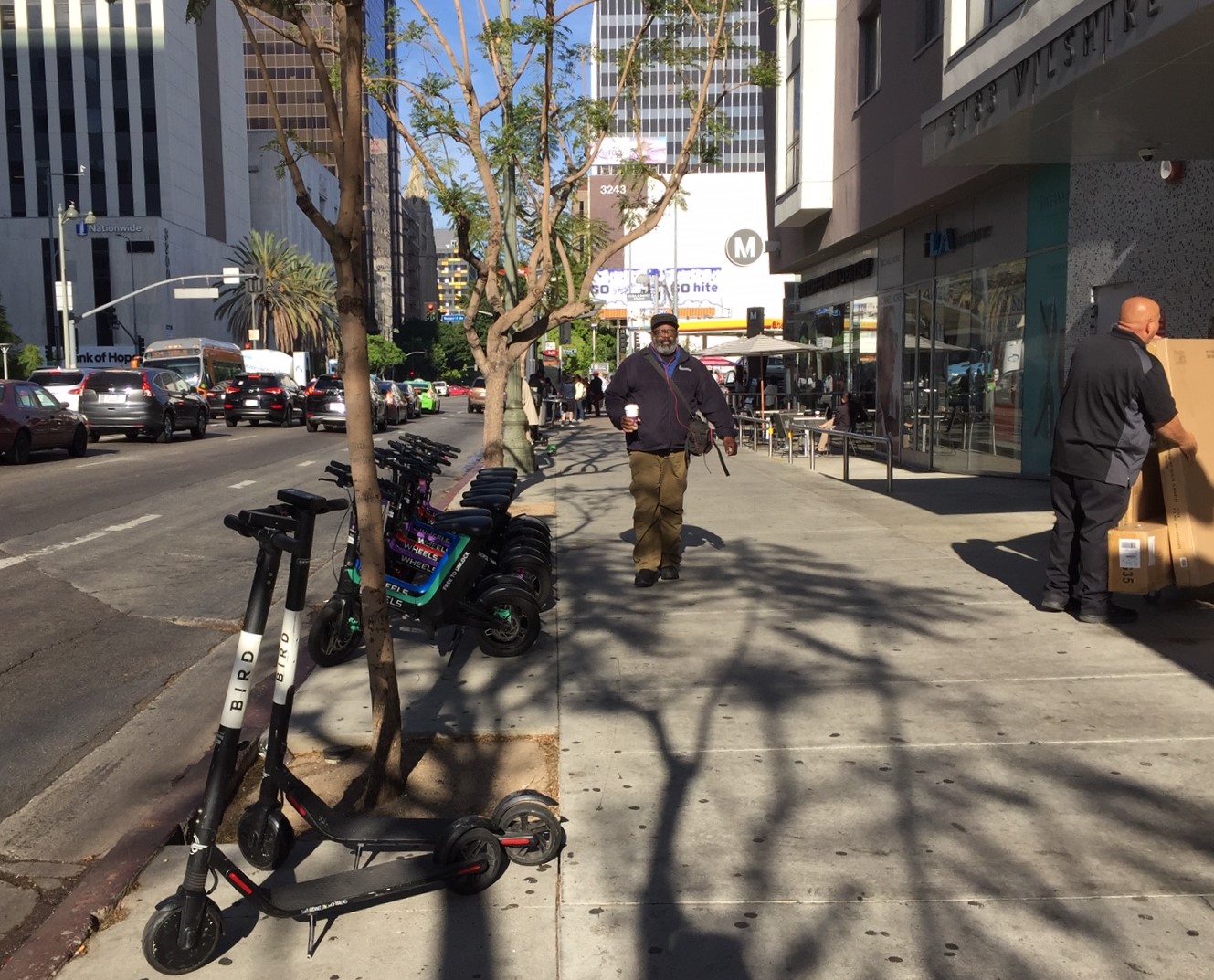
E-scooters parked at Metro Wilshire/Vermont station this morning. Metro is looking to better manage shared device parking at its sites. Photo: Joe Linton/Streetsblog L.A.
Note: Metropolitan Shuttle, a leader in bus shuttle rentals, regularly sponsors coverage on Streetsblog San Francisco and Streetsblog Los Angeles. Unless noted in the story, Metropolitan Shuttle is not consulted for the content or editorial direction of the sponsored content.
Metro is considering a "micro mobility vehicles program" to manage shared e-scooter and e-bike parking at Metro stations.
In March, the Metro Planning and Programming Committee heard an early version of proposed regulations for e-scooter parking at Metro stations. The initial version felt punitive. While it is true that Metro needs to ensure that shared devices do not block walk/wheelchair passage, the program seems to treat e-scooters as a nuisance, and not as a welcome first/last mile mobility option.
The program is designed to be self-sustaining, so there are application fees, monthly parking space fees, and impound fees. All these would be paid by scooter-share/bike-share companies. On Metro property, two hours after being reported, improperly parked devices would be removed by towing companies. The towing seems draconian for some situations that anyone present might much more easily and cheaply just stand a stray e-scooter up... but then there would be no impound fee for the towing company to collect and for Metro to share in.
The March proposal received some criticism from boardmembers who requested updates on: what parking would look like at various types of stations, geo-fencing, fees that would not discourage new mobility, and equity.
Yesterday, the planning committee received a revised e-scooter that clarifies a few things, but remains mostly punitive.
The earlier version proposed a $53 fee for devices parked outside of designated areas; the revised version ups that fee to $100. Devices blocking wheelchair access are subject to a $338 fee.
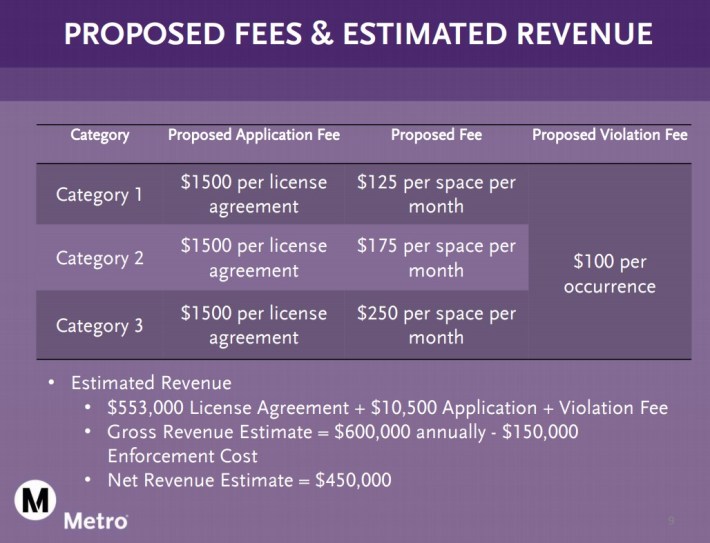
Metro has sorted its stations into four categories. These range from 1 being the most spacious sites to 4 being the most constrained.
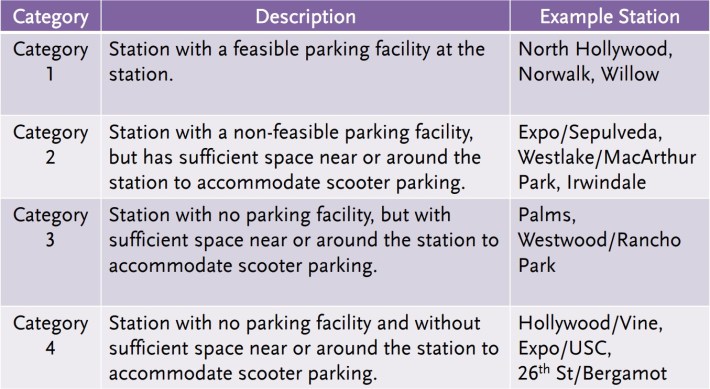
The proposal is for Metro to pursue shared-device parking in categories 1 through 3. For category 4 stations, devices would need to be parked off of Metro property, for the most part parking on adjacent city sites.
At stations with park-and-ride lots, the idea is to essentially lease parking spaces to e-scooter/e-bike companies. These companies would set up shopping-cart or airport-cart type racks.
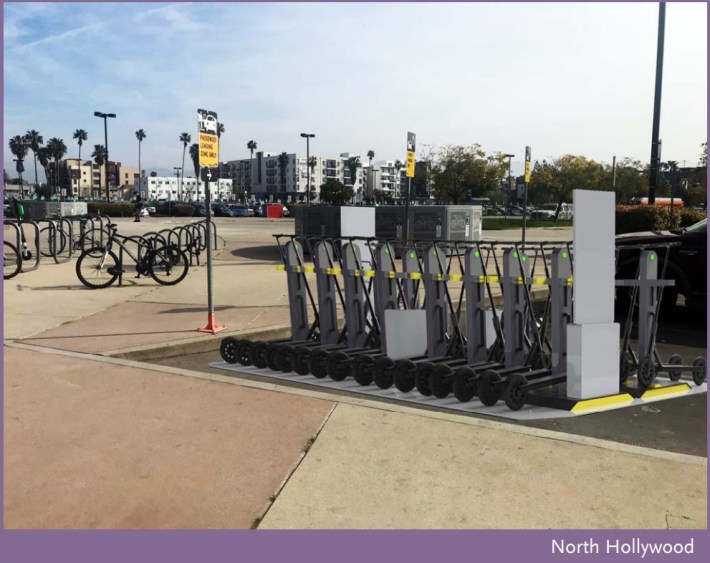
Unfortunately the parking space approach treats e-scooters and e-bikes like cars, when actual behavior is more like pedestrians. Placing e-scooter parking in parking lots tends to place them far from the short paths that pedestrians actually use. Like too many bicycle facilities, the solution here appears to be more "put them out of the way" than "put them where they're needed and useful."
At the NoHo station, as rendered by Metro above, it would more conducive for e-scooters to be located closer to the Lankershim Boulevard sidewalks, not in the parking space that Metro proposes. Imagine Orange Line riders having to cross Lankershim to pick up or drop off scooters in the parking space pictured above.
Pedestrians, cyclists, and scooter riders approach/leave many stations in several different directions, so it is a recipe for failure to assume that they would all use just one off-the-beaten-track centralized rack.
Docks at category 2 and 3 stations would be located in pedestrian areas.
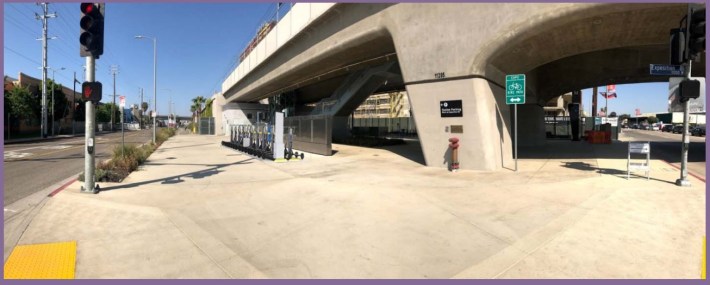
These pedestrian areas make more sense than parking spaces; they are more useful, more along pedestrians' beaten path. Focusing devices in a single location will still be tricky for stations with multiple entrances.
Staff did not include any changes responding to boardmembers' request for an equity component in Metro's e-scooter regulations. When questioned by boardmember Jacquelyn Dupont Walker, Metro Director of Parking Management, Countywide Planning and Development Frank Ching responded that the equity polity would be determined by the underlying city.
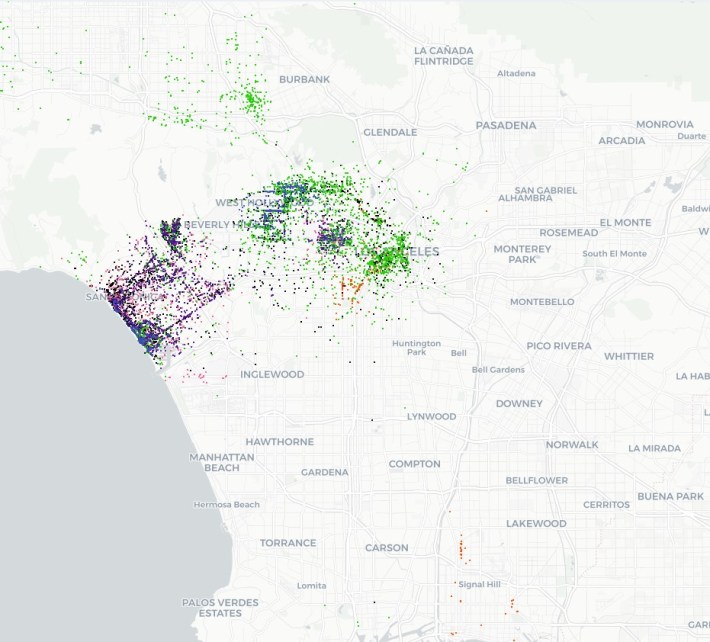
The city of L.A. has used incentives to try to push dockless companies to serve low-income neighborhoods but, for the most part, this has not worked. To date, e-scooters have proliferated in more well-off communities, including the Westside, and are absent or scarce in low-income communities, including South L.A. This is shown in recent mapping of device data.
Contrary to Ching's response, Metro can and should foster equity in its fee structures. For example, the agency could charge less (or nothing) to permit scooter parking at stations in low-income areas already underserved by e-scooter companies and other private and public mobility. Charging companies a uniform parking fee across the entire system is equality, not equity. A uniform fee is likely to result in rare poorly-managed e-scooters in low income communities and plentiful well-managed e-scooters in high-income areas.
Overall the policy appears to be trying too hard to treat dockless mobility as docked mobility. Dockless devices are extraordinarily flexible, with utilization determining where devices end up. This flexibility allows devices to accumulate differently at different days and times; parking can easily spike for big events, such as a concerts or sporting competition, then shrink back to everyday levels. Metro's interventions shouldn't mean dozens of e-scooters being towed on, say, football game days.
Metro must ensure that e-bikes and e-scooters do not block Metro users, especially folks dependent on wheelchairs. Solutions should be proportional to the magnitude of the problem.
Though Metro would like the efficiency of a single board approval to be done with device regulations, the process is more likely to be iterative, as these new shared mobility devices are still in their infancy.
Metro needs to find appropriate solutions, but not look to too tightly rein in new, popular, and environmentally-friendly modes. The best solutions are unlikely to be broad top-down one-size-fits-all regulations. Metro should work closely with locals - cities and the public - as well as scooter companies and devise station-specific programs to best serve mobility and equity.
Read More:
Stay in touch
Sign up for our free newsletter
More from Streetsblog Los Angeles
LAPD Was Crossing Against Red Light in Crash that Killed Pedestrian and Injured Six in Hollywood
The department says the officers had turned on their lights and sirens just before crossing, but won't say why they did so.
Freeway Drivers Keep Slamming into Bridge Railing in Griffith Park
Drivers keep smashing the Riverside Drive Bridge railing - plus a few other Griffith Park bike/walk updates
